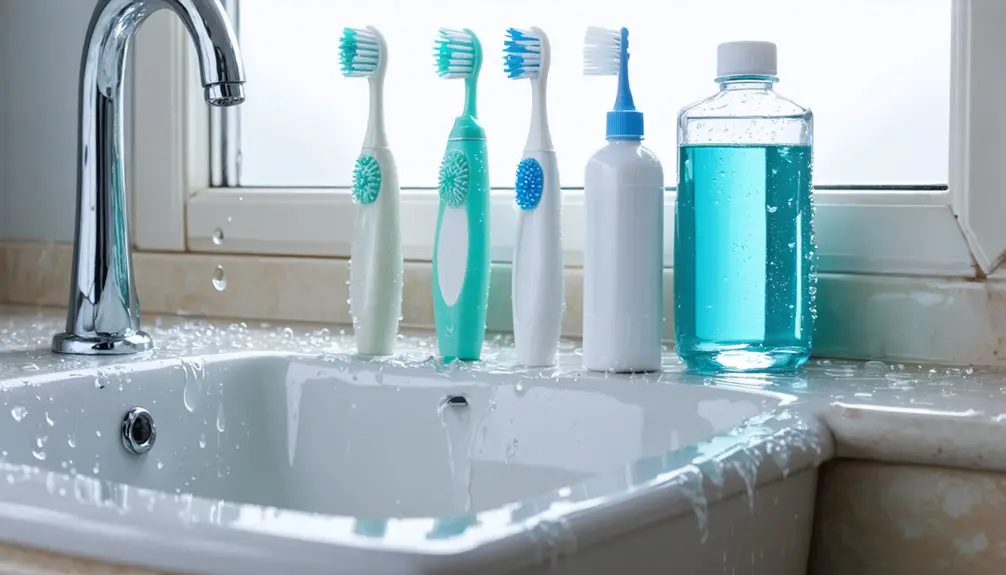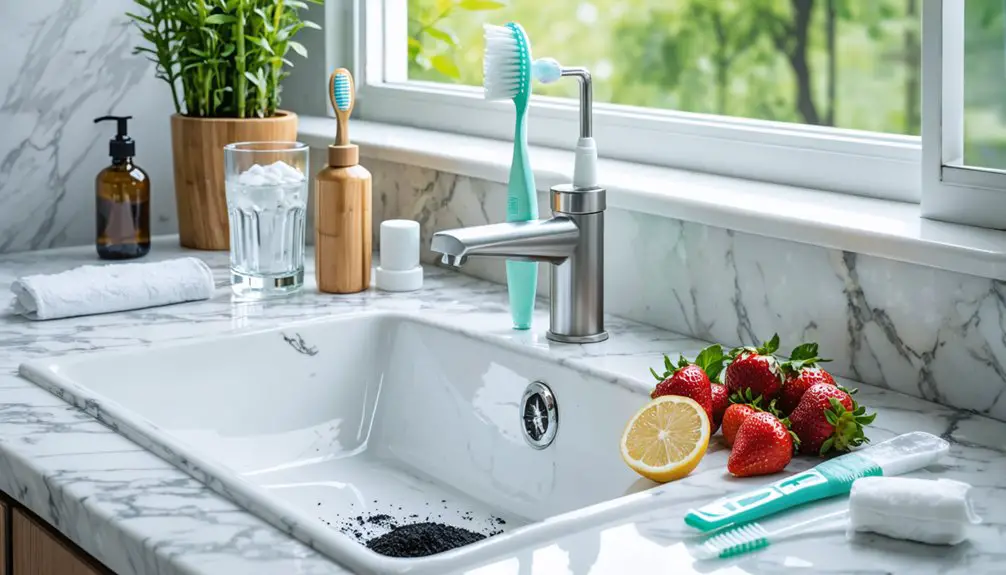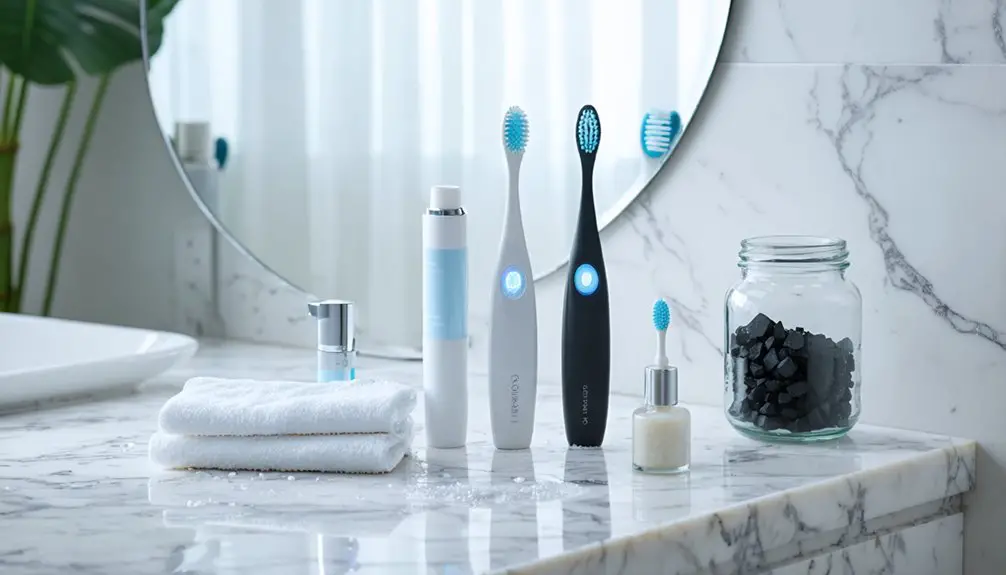To maintain a bright smile, you’ll need to master five essential habits. Start with proper brushing technique using a soft-bristled brush at a 45-degree angle for two minutes, twice daily. Don’t skip daily flossing and interdental cleaning to remove hidden plaque. Schedule regular dental check-ups for professional care and early detection. Choose foods rich in calcium while limiting sugary snacks. Finally, verify you’re getting adequate fluoride through toothpaste and rinses. These proven strategies will guide you toward ideal oral health.
Key Takeaways
- Brush teeth twice daily using a soft-bristled toothbrush and gentle circular motions for two minutes at a 45-degree angle.
- Clean between teeth daily using floss or interdental brushes to remove plaque and prevent gum disease.
- Visit your dentist regularly for professional cleanings, early disease detection, and preventive care.
- Maintain a healthy diet rich in calcium and vitamins while limiting sugary and acidic foods.
- Use fluoride toothpaste and rinses to strengthen tooth enamel and protect against decay.
Master Your Daily Brushing Routine
While maintaining good oral hygiene requires several key practices, mastering your daily brushing routine forms the foundation of a healthy smile.
Start with proper toothbrush selection, choosing a soft-bristled brush that comfortably fits your mouth and displays the ADA Seal of Acceptance. Replace it every three to four months to guarantee peak cleaning efficiency. Brush twice daily as recommended by dental professionals for optimal oral health.
A well-chosen toothbrush is essential – opt for soft bristles, proper size, and ADA approval to ensure effective daily cleaning.
Your brushing techniques should include positioning the brush at a 45-degree angle to your gum line, using gentle circular motions rather than harsh scrubbing. Using fluoride toothpaste helps prevent cavities and strengthens tooth enamel.
Spend two full minutes brushing, dividing your mouth into four quadrants and dedicating 30 seconds to each section. Cover all surfaces systematically, including the often-neglected back molars and tongue.
Remember to maintain light pressure throughout to protect your enamel and gums while effectively removing plaque.
The Power of Flossing and Interdental Care
Beyond regular brushing, effective interdental cleaning serves as an essential component in maintaining ideal oral health.
You’ll find that interdental aids, including floss, brushes, and oral irrigators, target areas your toothbrush can’t reach effectively. Research shows these tools considerably reduce plaque buildup and prevent periodontal disease when used consistently.
Choose interdental aids that match your specific needs – consider the size of spaces between your teeth and your manual dexterity. For best results, use these tools at least seven times per week.
Interdental brushes often outperform traditional floss in plaque removal, particularly in larger spaces. When combined with powered toothbrushes, these aids deliver remarkable improvements in gum health and help prevent tooth decay, especially in hard-to-reach areas. Studies indicate that daily flossing can lead to a 32% lower odds of developing high levels of interdental plaque compared to those who don’t use interdental cleaning aids. This is particularly important for seniors, as 70.1% of adults aged 65 and older experience some form of periodontal disease.
Professional Dental Visits: Your Path to Optimal Health
Regular dental visits represent a cornerstone of both oral and overall health, with compelling evidence showing their far-reaching benefits. You’ll experience numerous dental visit benefits, including early disease detection, preventive care, and stronger oral hygiene habits.
Studies reveal that those who maintain routine dental appointments are 42% more likely to report excellent overall health.
The health correlations extend beyond your mouth – regular dental visits link to increased daily energy, better productivity, and higher life satisfaction.
Research shows that skipping dental care often correlates with poor mental health and increased feelings of loneliness.
You’ll also save considerably on healthcare costs, as every dollar invested in preventive dental care saves $8-$50 in future treatments.
If you have dental insurance, you’re positioned to maximize these advantages, as covered individuals are nearly twice as likely to maintain annual visits compared to those without coverage.
Groups that focus on preventive dental care demonstrate 86% lower costs on major dental services over time.
Smart Choices for Diet and Lifestyle
Making informed dietary and lifestyle choices plays a pivotal role in maintaining ideal oral health, as research demonstrates direct correlations between nutrition and dental outcomes.
Scientific evidence confirms that smart nutrition and lifestyle decisions are essential foundations for achieving and sustaining optimal dental health.
You’ll need to focus on nutrient sources rich in calcium, vitamin D, and vitamin C to support strong teeth and healthy gums. Best dietary patterns include dairy products, leafy greens, and whole grains while limiting sugary and acidic foods.
To protect your oral health, consume sugary foods only during meals when saliva production is highest. Regular dental check-ups are essential to monitor oral health, especially when making significant dietary changes. Fresh fibrous foods can naturally help remove plaque while eating.
You’ll want to incorporate diverse nutrient sources through balanced meals featuring fish, nuts, and fibrous vegetables. Stay hydrated with water throughout the day, and avoid frequent snacking on processed carbohydrates.
These strategic choices will help prevent tooth decay, strengthen enamel, and maintain healthy gum tissue.
Fluoride: Your Teeth’s Best Defense
While many dental health practices contribute to cavity prevention, fluoride stands as the most scientifically validated defense against tooth decay. You’ll find fluoride benefits that include enhanced enamel remineralization, protection against bacterial acid attacks, and sustained cavity prevention through constant presence in your saliva. When present in small amounts during tooth formation, fluoride strengthens enamel significantly.
You can access fluoride sources through multiple channels. Community water fluoridation provides a consistent baseline protection, while fluoridated toothpaste, professional varnishes, and rinses offer additional defense. Major health organizations like the American Academy of Pediatrics have strongly endorsed fluoride’s safety and effectiveness in preventing dental decay.
If you’re in a non-fluoridated area, supplements and fluoride-containing dental materials can help bridge the gap. Research shows these interventions can reduce tooth decay by up to 25% in both children and adults.
Frequently Asked Questions
Can Medications Affect Tooth Color and Oral Health?
Yes, you’ll find that many medications can cause tooth discoloration, both temporary and permanent. Common medication effects include surface staining, intrinsic discoloration, and other oral health changes affecting your teeth’s appearance.
How Do Dental Implants Compare to Natural Teeth for Maintenance?
You’ll need daily oral hygiene for both, but implants can’t get cavities like natural teeth. While implant longevity requires monitoring for gum inflammation, they typically need less maintenance over time.
Is Teeth Grinding During Sleep Harmful to Dental Health?
Yes, teeth grinding severely damages your dental health by wearing enamel, causing fractures, and triggering TMJ pain. It’s often linked to sleep disorders and stress management issues that need addressing.
Does Genetics Play a Role in Cavity Susceptibility?
Your genes greatly influence cavity risk, with about 60% of susceptibility determined by genetic factors. Understanding your genetic predisposition helps develop targeted cavity prevention strategies for ideal dental health.
Can Certain Vitamins or Supplements Improve Dental Health?
While supplements alone won’t fix poor dental hygiene, you’ll gain essential vitamin benefits through calcium, vitamin D, and vitamin C intake – strengthening teeth, boosting gum health, and supporting post-treatment healing.
References
- https://humblememorialdental.com/dental-tips/oral-health-statistics/
- https://www.alpinewhite.com/en/article/dental-hygiene-statistics/
- https://www.afspa.org/blog/the-importance-of-dental-hygiene/
- https://www.pharmacytimes.com/view/maintaining-good-oral-hygiene-is-the-gateway-to-general-health-and-well-being
- https://www.nidcr.nih.gov/health-info/oral-hygiene
- https://www.health.harvard.edu/blog/whats-the-right-way-to-brush-your-teeth-202211232854
- https://www.mouthhealthy.org/all-topics-a-z/brushing-your-teeth
- https://healthcare.utah.edu/the-scope/health-library/all/2023/09/brushing-your-teeth-dentists-guide-perfect-technique
- https://www.ada.org/resources/ada-library/oral-health-topics/toothbrushes
- https://pmc.ncbi.nlm.nih.gov/articles/PMC7443997/



